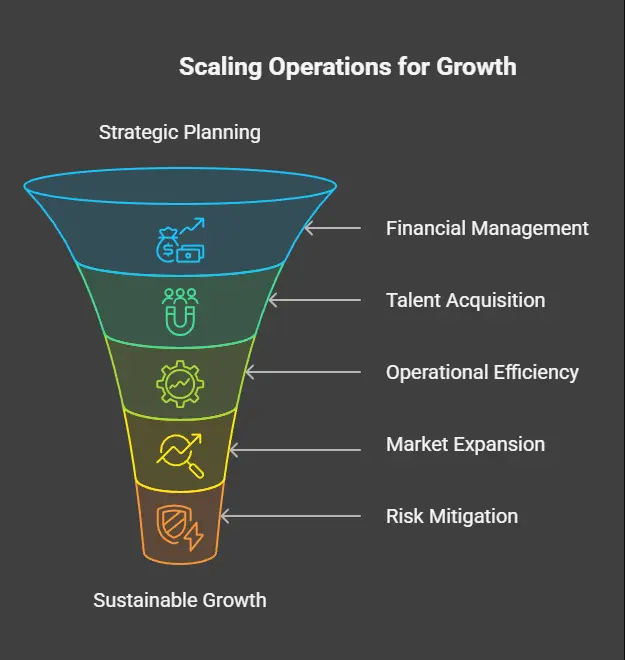Have big plans for your company but lack funding? Don’t let a lack of funds stop you. Your trade license, which is a seemingly little piece of paper, might hold the key to getting the money you require. It’s more than just a license; it’s a seal of approval that demonstrates to lenders and investors that you take business seriously and abide by the law. Let’s examine How a Trade License Can Help Secure Business Funding and Investment?
The trade license works as a driving force for all the lenders and investors. This ultimately increases importance of any company. A trade license is essential for obtaining the capital and investment required to drive business expansion because it attests to the business’s lawful operation and compliance with regulations.
Let’s acknowledge the possible opportunities that this crucial license can bring towards your company.
Importance of Business Funding and Investment
Investments and business funding are essential to any enterprise. They offer the monetary resources required to support sustainability, innovation, and growth. Below is a summary of their importance:
- Start-up Capital: Provides the first money needed to launch a business. It pays for expenses related to operations, marketing, and product development.
- Research and Development: Gives funding for market research, technological developments, and product development in order to introduce innovation.
- Sales and Marketing: Promotes brand recognition, draws clients, and boosts revenue.
- Working Capital: Provides funding for ongoing costs such as utilities, payroll, and inventory to guarantee smooth operations.
- Emergency Funds: Offers a safety net for unforeseen difficulties such as natural disasters or downturns in the economy.
- Talent Acquisition: Facilitates the hiring of elite personnel to promote creativity and effectiveness.
- Market expansion: Creates new clientele and business prospects.
- Investor Returns: Offers capital contributors a return on their investment.
- Job Creation: Promotes economic expansion by generating job opportunities.
- Tax Revenue: Through commercial operations, governments are able to collect taxes.
- Debt Financing: it makes you eligible to Interest-bearing loans from banks, investors, or other financial organizations.
- Equity Financing: involves exchanging capital for ownership shares in the business.
- Crowd Funding: Using internet platforms, a large number of people can contribute money.
- High-Net-Worth Individuals: who invest in startups are known as angel investors.
- Venture Capital: Investment companies that give money to companies with high growth potential.
Understanding Trade Licenses:
Running a business does not require only pre-planning but also needs permission from relevant authorities. This assists you in accessing to all the legal facilities imposed by government. This is where the trade license comes to the rescue. Making sure of the business permit, this is your lawful proof of permission by the government. From the exact definition to the entire process, everything is transparently defined in this Informational piece. Whether you are the owner of the company or just an investor, in both cases, getting the complete knowledge is mandatory.
A trade license is a consent settled by the government to a business to operate in a particular area. It guarantees that the company complies with safety requirements and local laws. It boosts the local economy. Typically, a trade license must be obtained prior to opening a business.
Process of Obtaining a Trade License:
- Determine the Authority for Licensing: Find the local government agency in charge of granting trade permits (typically a municipal corporation or district council). Collect the
- Necessary Paperwork: Get ready the paperwork you’ll need, including identification, business registration, evidence of ownership or lease, and any other documentation unique to your kind of business.
- Fill out the Application Form Completely: Accurately fill out the application form with all the details about your firm after obtaining it from the licensing authority.
- Application Submission and Fees: Send in the filled-out application form, the necessary supporting documentation, and the appropriate payment.
- Inspection (if necessary): To make sure that all rules are being followed, the licensing authority may conduct an inspection of your company’s location.
- License Approval & Issuance: The trade license will be issued in the event that the application is accepted.
Note: Depending on your area and kind of business, the particular procedure and requirements could change.
Establishing Legitimacy and Credibility:
It’s not enough to stand out in the competitive marketplace of today. You must be believed. Establishing credibility and legitimacy is essential to growing a profitable company. Partners, investors, and customers are more inclined to work with a business that they believe to be dependable and trustworthy. Let’s examine methods for creating a lasting impression and cultivating enduring relationships.
Legal Recognition:
Establishing a business’s validity and credibility requires legal acknowledgment. It offers a structured framework that guarantees the company stays within the law. Customers and partners will be more trusting of you as a result of this recognition, which also creates doors to other prospects like government contracts, financial resources, and legal protection.
Building Trust with Investors:
Developing credibility and legitimacy with investors is essential to gaining their trust. This entails showcasing a strong operational base, a track record of accomplishments, and open company practices. Through exhibiting proficiency, upholding industry norms, and ensuring unambiguous communication, business owners can cultivate investor trust and secure funding for their endeavors.
Facilitating Access to Financial Services:
Financial services accessibility is essential for realizing economic potential. Let’s investigate ways to remove obstacles and guarantee that everyone has an equal opportunity to engage with the financial system.
Opening Business Bank Accounts:
Establishing a company bank account is necessary to make it easier for customers to obtain necessary financial services. It offers a safe environment for handling company finances, sending and receiving payments, and building credit. By streamlining financial processes, a specialized business account helps entrepreneurs develop their businesses and manage their money more successfully.
Access to Loans and Credit Facilities:
In order to make these financial services more accessible, it is necessary to expedite application procedures, offer financial education, and encourage the expansion of lending institutions. In the end, this will empower business owners and promote economic growth.
Enhancing Business Visibility and Reputation:
In the congested market of today, standing out is crucial. Let’s discuss how to increase the visibility of your company and establish a solid reputation that will help you stand out from the competitors.
Professional Image:
A company’s or business’s reputation is determined by its representation and portfolio. Businesses may establish credibility, draw in new customers, and strengthen their position in the market by developing a polished brand identity, providing outstanding customer service, and sustaining a steady online presence.
Market Presence and Customer Confidence:
Customer confidence and market presence are linked. Establishing a solid reputation requires creating a strong market presence through targeted marketing, branding, and first-rate customer service. Businesses may develop trust and loyalty from their customers by continuously providing value and going above and beyond their expectations. This will enhance their market share and ensure long-term success.
Compliance with Legal and Regulatory Requirements:
Successful business operations require more than just a superior product or service. It is crucial to comprehend and abide by a complicated web of laws and regulations. Compliance is essential for upholding environmental regulations and consumer protection as well as for fostering trust, averting expensive fines, and preserving a positive reputation.
Let’s talk about how to get around this legal maze and make sure your company is stable.
Meeting Government Regulations:
Complying with government regulations necessitates following a convoluted legal framework and industry-specific guidelines. For businesses to stay out of trouble with the law, safeguard their brand, and continue operating sustainably, they need to invest in strong compliance procedures. Businesses can ensure their long-term sustainability and promote an ethical and accountable culture by comprehending and adhering to these principles.
Avoiding Legal Penalties:
Businesses may reduce risks, safeguard their brand, and stay out of trouble by being aware of and abiding by the relevant regulations. Proactive compliance management include keeping abreast of legislative changes, putting in place strong compliance systems, and encouraging an ethical conduct culture inside the company.
Supporting Growth and Expansion:
Are you prepared to advance your company’s operations? Growing can present both opportunities and difficulties. Let’s talk about how to get the help and resources you need to propel your development. We’ll talk about how to draw in capital, form reliable alliances, and streamline your business processes in order to grow.
Scaling Operations:
- Strategy: Specify target markets, growth objectives, and resource distribution.
- Finance: Obtain capital, control cash flow, make efficient investments.
- Talent: Assemble a solid team, make wise hiring decisions, and help staff grow.
- Operations: Simplify procedures, make use of technology, and maximize available resources.
- Market: Locate fresh prospects, modify current products, and establish a presence.
- Risk: Evaluate threats, make backup plans, and lessen potential hazards.
- Infrastructure: Make scalable system and technological investments.
- Client: Continue providing high-quality service, get input, and adjust as necessary.
- Performance: Track progress, set KPIs, and make data-driven choices.
- Innovation: Encourage originality, try new things, and be flexible.
Entering New Markets:
When entering a new market, one must carry out in-depth market research, comprehend cultural quirks, modify goods or services, form reliable local alliances, and create a wide-ranging distribution network. Through meticulous examination of market potential and customized strategy development, enterprises can effectively broaden their customer base and boost profits.
Investor Confidence and Attraction:
More than just statistics are involved in securing investment. It involves persuading possible investors that your company is a wise investment with big return potential. It’s about eliciting self-assurance and presenting an engaging future image for your business. Let’s investigate the methods to bring that about.
Meeting Investor Requirements:
Gaining investor interest necessitates a thorough comprehension of investor priorities. Businesses can win over investors by putting together a credible investment thesis. Also, they transparently presents financial predictions, and emphasizing the competitive advantage of the business. Long-term investor relationships and obtaining required capital require effective communication, frequent updates, and a clear exit strategy.
Showcasing Business Stability:
Maintaining a stable business is essential to luring lenders and investors. Securing funding and better terms is greatly increased when one can demonstrate a stable business with consistent performance, strong finances, and effective management. This is because investors are risk averse.
Case Studies and Real-World Examples:
Nothing compares to witnessing firsthand how others have overcome challenges to create successful businesses. Let’s examine real-world case studies that demonstrate creative thinking, conquering obstacles, and attaining impressive growth. Through analyzing these cases, we can obtain insightful knowledge and motivation for our own business ventures.
Success Stories:
Connect staff is the recognized name among the best facility provider. They are expert in providing the professional team that is needed on different occasion. However, they contacted us to source their trade license to keep running their business smoothly without any hurdle. We successfully fulfilled all their required needs along with simplifying the procedure for them.
Lessons Learned:
Our business has created a streamlined procedure for getting trade licenses in a number of different industries. Our years of experience have allowed us to develop a thorough understanding of the intricate regulatory environment. Because of our experience, we quickly determine which particular licenses are needed for various types of businesses, collect the required paperwork, and easily navigate bureaucratic processes. Our objective is to save clients as much time and effort as possible during this process so they can concentrate on their main business activities.
Conclusion:
In the cutthroat world of business, getting a trade license is frequently the first step toward getting the funding needed for expansion. A trade license greatly increases a business’s credibility by signifying legal operation, compliance with rules, and a dedication to business integrity. It acts as a cornerstone for creating a solid foundation for company stability, which is a crucial component that draws in lenders and investors. In the end, having a trade license could mean the difference between getting the money you need and running into unneeded obstacles.
Recall that although a trade license is essential, it is only one component of the picture. Your chances of obtaining the capital required to turn your business around will be greatly increased if you combine it with a well-written business plan, solid financial performance, and a defined growth strategy.
FAQs:
What is a trade license in the UAE?
It is a legal permit that authorizes your business to operate and defines your business activity.
Can I apply for business funding without a trade license?
No. Banks and investors require a valid trade license to verify your company’s legal standing.
What types of trade licenses are available in the UAE?
Commercial, professional, and industrial licenses are the most common, each tailored to specific business activities.
How does a trade license help in securing business loans?
It acts as proof of legitimacy, enabling banks and lenders to assess your financial credibility and compliance.
Is it possible to attract foreign investors with a UAE trade license?
Yes. A valid trade license builds investor trust and showcases your business as a compliant and operational entity.
Does renewing a trade license affect business funding opportunities?
Absolutely. A renewed license demonstrates business continuity and regulatory compliance, which lenders and investors value.






